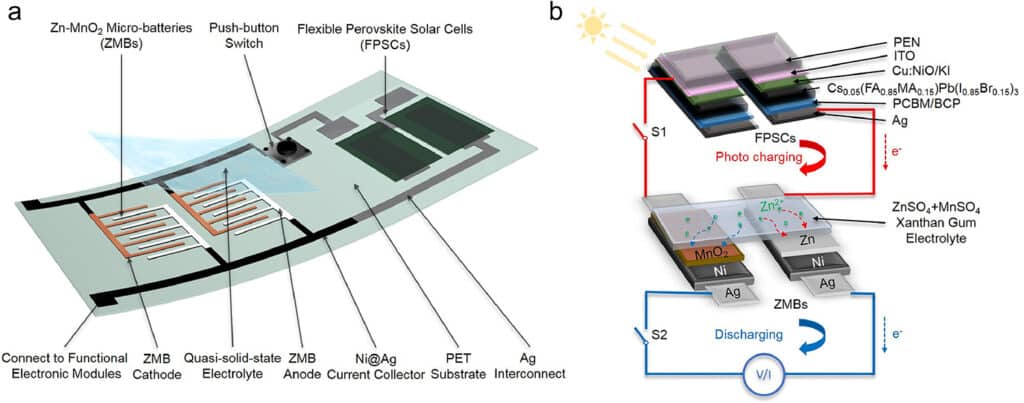Miniaturized integrated, flexible electronics have become very attractive for research and commercialization due to their unique characteristics, such as high flexibility, ultralightweight, and promising potential in applications such as real-time health monitoring, intelligent interaction, etc. As a crucial component in these devices, the power supply unit should provide continuous energy without frequent charging or component replacement.
A team of researchers from the University of Surrey has developed a renewable and rechargeable battery prototype, which needs only thirty seconds of sunlight to boost the battery life of future smartwatches and other wearables by tens of minutes.
Surrey’s environmentally friendly, photo-rechargeable system merges stable and ultra-high-rate quasi-solid-state zinc-ion batteries with flexible perovskite solar cells. The system is unique because of its elegant and well-matched structural design between the integrated battery and solar cell, allowing it to demonstrate high energy and volume density comparable to state-of-art micro-batteries and supercapacitors.

In particular, researchers first introduced a nickel (Ni) protective layer into optimized Zinc-ion micro-batteries to stabilize battery configuration and facilitate enhanced electrochemical performance. In lab tests, the optimized micro-zinc ion battery exhibits ultrahigh volumetric energy density of 148 mWh cm−3 and power density of 55 W cm−3 at the current density of 400 C (5 mA cm−2), enabling them to be comparable with the state-of-the-art micro-batteries or supercapacitors fabricated by conventional methods.
The embedded perovskite solar cells show excellent photovoltaic performance, sufficient to charge the batteries and create a self-charging system capable of offering energy autonomy in miniaturized wearable electronics. The integrated systems can achieve an ultrafast photo-charging within 30 seconds, with sufficient energy to power other functional electronics for tens of minutes. The prototype offers a promising scheme for next-generation miniaturized flexible photo-rechargeable systems.
“The unique features in our ultrafast photo-rechargeable system could promote wide applications in self-powered wearable internet-of-things, autonomous power systems, and emergency electronics,” said Dr. Yunlong Zhao, project co-lead and expert in batteries for wearables and implantables from the ATI. “In addition, it will broaden the perception and insight of designing the next generation of miniaturized flexible photo-rechargeable systems.”
New battery only needs seconds of sunlight to keep wearables charged
Source: Tambay News

0 Comments